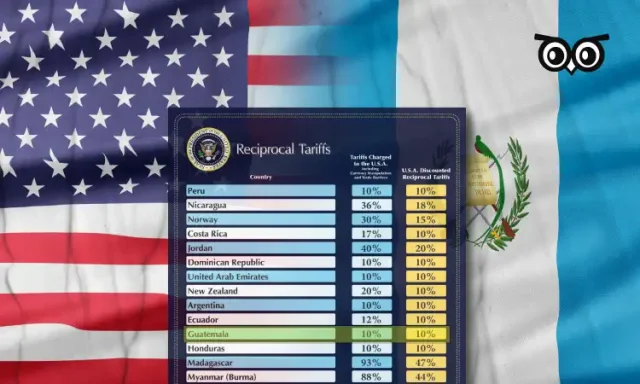Countries are running to make trade deals with the United States, to get ahead of the Reciprocal Tariff Schedule (RTS). There is a small country that stands alone in deserving preferential treatment from the United States: Guatemala.
Guatemala has long been a key US ally, particularly on crucial issues such as combating communism during the Cold War and the Chinese presence in our hemisphere. Guatemala has shown constant support for US policies toward Taiwan and Israel. From the standpoint of US interests, Guatemala has cooperated on illegal migration, drug trafficking, reintegration of deportees, and support for US allies in international forums—the United Nations and the Organization of American States.
These attributes alone would justify her preferential treatment. However, other reasons abound.
Regarding trade, Guatemala is a country that consistently reports a trade deficit with the United States. Guatemala has lower and fewer official and unofficial barriers to trade with the United States than other developing countries. Further, Guatemala has expressed no intention to impose retaliatory tariffs.
Excluding Guatemala from the new tariff schedule would serve US interests. In particular, an exemption would boost Guatemala’s prosperity potential, fortifying her competitiveness against rival exporters to the United States, many of which are Chinese proxies. The creation of jobs in Guatemala would reduce the incentives for illegal migration and, thus, the influence of the drug cartels that control the flows into the United States of illegal immigrants and narcotics such as fentanyl. This would save US lives.
Guatemala’s exclusion from the new US tariff schedule would serve US interests by making Guatemala more competitive regarding Chinese manufacturing export proxies in Asia (Vietnam) and closer to home (Mexico). Under preferential exclusion, Guatemala could exploit trade diversion to compete against countries like Vietnam, Cambodia, and Mexico, which serve as Chinese re-export hubs. Guatemala’s exclusion would also incentivize other countries in our hemisphere to follow her example of fidelity.
Preferential treatment for Guatemala would send an important global message: the United States rewards her allies that actively cooperate with US foreign policy. This message would strengthen the US geopolitical strategy, incentivizing other developing countries to follow suit, especially in the Western Hemisphere.
Guatemala can offer win-win concessions of her own. She should, for example, address the US Trade Representative’s (USTR) National Trade Estimate (NTE) Report 2025, which makes valid recommendations for Guatemala on the matter of trade reforms.
To be sure, these recommendations substantially align with those that have been traditionally made by Guatemala’s Organized Employment Sector (OES). However, the OES rejects the NTE’s arguments on labor issues on the grounds that they are contrary to the shared goals of both nations and would harm Guatemala’s development potential.
The Guatemalan OES has strategically prioritized the very same reforms mentioned in the NTE 2025 report to address US concerns while safeguarding Guatemala’s development. These include strengthening intellectual-property enforcement to combat piracy of clothing and counterfeit medicines, as well as unlicensed software use in public institutions, through initiatives like the Chamber of Industry’s Formal Trade Defense Commission. The OES also supports streamlining customs processes to align with the WTO Customs Valuation Agreement, expediting investigations by Guatemala’s tax authority, which currently delay cargo release. In addition, simplifying and accelerating the refund of the 15 percent withheld VAT would improve liquidity for US businesses operating in Guatemala.
Port operations, a critical trade bottleneck, have also constituted another OES priority. The OES has long advocated for centralized risk analysis, coordinated joint inspections, and the elimination of redundancies, such as double inspections of refrigerated cargo, to reduce delays and protect the cold chain. Similarly, the OES backs reforms to streamline food registration processes, allowing registration by plant or company rather than by product, and enhancing transparency in sanitary and phytosanitary protocols. For agricultural biotechnology, the OES supports accelerating technical approvals in the Ministry of Agriculture’s Biotechnology Department, reducing bureaucratic delays.
In public procurement, the OES has long advocated combating corruption in the state’s Guatecompras procurement system, improving transparency and access for US suppliers. To spur both national and foreign investment, the OES has pushed for simplified laws, clearer regulations, and consistent judicial rulings. Anticorruption measures, particularly in ports, are also a cornerstone of the OES’s reform agenda, aimed at creating a more welcoming environment for businesses in general.
Guatemala’s contributions to US priorities extend beyond trade. Her cooperation on migration control, drug trafficking, and deportee reintegration directly supports US migration policies. A more prosperous Guatemala, enabled by substantial access to US markets, would create jobs and reduce migration pressures. Less emigration would weaken drug cartels that exploit routes for human trafficking and narcotics smuggling. Excluding Guatemala from the RTS would amplify the bilateral partnership and encourage deeper cooperation in port control, infrastructure, and joint military operations.
The OES should mobilize to ensure Guatemala’s government acts decisively and urgently. Guatemala needs an integrated negotiating team, including the Ministry of Economy, Foreign Affairs, Defense, and Interior, to present a unified front. This effort should underscore Guatemala’s commitment to trade, migration, and security reforms that benefit both nations.
Excluding Guatemala from the RTS would be a strategic win for the United States. It would strengthen a loyal ally, mitigate illegal migration and narco-trafficking, counter Chinese influence, and promote regional stability—all while preserving the economic advantage of the Americas.
Rewarding Guatemala would send a clear message that the United States stands by her allies.

Nicholas Virzi
Virzi is dean of the ASTRA Institute for Leadership and Governance. He holds a doctorate in international relations from the University of Salamanca.








